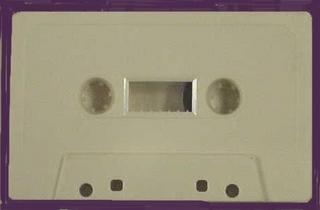
Last week I received an email asking if I would like to join a forum on cassette culture. Perhaps after years of neglect has the day of the humble cassette finally come?
The great thing about the cassette was that in the period 1978-81 it broke the censorship which vinyl had imposed on music making and distribution. Even after punk and the rise of the independent label the costs of making and the difficulties of distributing records were still insurmountable hurdles for most bedroom artists. Vinyl and its successor the CD don’t really make sense as a way of producing small numbers of copies. Any print based medium (records, books, films etc) that necessitates the making of a master form which copies are then made will always load cost at the front end, the mastering stage. These costs not only provide a barrier to entry (a fixed sum has to be found), but also are weighed against anyone wanting to make a small number of copies. The more copies you make, the more those cost are diluted, but at the 200 to 500 stage which is where most DIY artists are working, it's all cost and you are hard pressed (pardon the pun) to just pay for the mastering. This would be different of course were people willing to pay more for small runs, but bizarrely its often been small labels who have been the first to try and reduce the price of the finished item. Mass produced records should; always have been dirt-cheap; £1 would be about the right price for a million sellers, whereas your small run should be £25.
The humble tape exhibits the reverse of the print phenomena; it makes more sense the less copies you make. The one-to-one copying system has no mastering costs, nor does the photocopied cover. There was also no need to make any more copies than you needed. However this is even truer of the MP3 where you do away with the physical format altogether. Aside form bandwidth it makes no financial difference if 2 people download a file or 2 million. One could argue that the MP3 finishes off what the cassette started it takes the censorship out of the equation. But we are fickle consumers and like our things, we like to have and to hold, we love to finger the sleeves and collect and display. We even like getting things through the post. There may be a danger here of getting hung up on media specificity; of fetishising the cassette when it was the culture that mattered.
Update 2012. Amusing to read this entry form 2005 back as this year I had an LP released in an edition of 100 which indeed does cost £25 + to purchase. Seven years on the MP3 is the mainstream way of distributing music but LPs, and yes even cassettes are proving popular ways of releasing anything left of centre. An MP3 release will also struggle to get reviewed and still seems in some ways virtual.
No comments:
Post a Comment